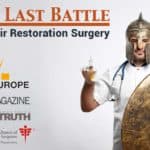The BBC plans to release an interview about hair transplantation in Turkey and other vacation hotspots soon. A new phenomenon, and social issue, in cosmetic surgery is combining the pleasure of tourism with the practice of cosmetic medical procedures. The BBC news story has decided to use cheap hair transplantation as the example.
A multitude of unsuspecting victims can look like disaster itself if they pick the wrong cosmetic surgeon. Open-minded people typically equivocate phony or incapable medical practices as over-reliant on marketing while charging up the wazoo. However, foreign clinics that promise an all-inclusive trip can put more emphasis on a pleasant visit than a believable cosmetic result. Clinics from less privileged nations typically charge less than competitive clinics from privileged nations. Open minded patients typically assume a capable clinic in its own locale enjoys global recognition and prestige. This is often the case, but dishonest clinics in tourist locales will misrepresent their capabilities.
Meet James, a Victim of Predatory Medical Tourism
The first spotlight in the BBC interview is a patient, James from Pangborn, who had to repair bad hair transplant work.
You can imagine a hair like with, with hair sort of going in all different directions. Almost like, you know, I don’t know, like an action man figure from the eighties or something,
> he begins.
Even hair transplant surgeons capable of extracting grafts and transplants must understand their patients’ ethnic distinctions and natural hairline. The best hair transplant surgeons also plan ahead; the entire purpose of the surgery, for most patients, is to age with grace. James had done enough research and felt dismayed at what was obviously a botched procedure. As he puts it:
I, I was, it was incredibly emotional and the holiday was spent panicking and thinking, what have I done?
James’ immediate reaction back at home was a lingering need to correct his new, and unexpected, problem. “I’d been led to believe it was, it was, it would be a doctor who carries out the procedure,” James explains. “It wasn’t post-holiday post that experience.”
Research ad hominem is essential when looking to correct a disastrous procedure. “I went online and actually did my research, which is a huge piece of advice to listeners, you know, I mean, I know I sound like a fool, but I was desperate to ‘do your research’ before you do anything.”
The benefit of research is knowing your sources. There is a plethora of experiences and experts to rely on. Who does James recommend? “There’s um, there’s a guy called Spencer Stevenson on Spex. That’s an online forum, and you can find loads of information out there, from that. There’s a radio show called The Bald Truth, again, I think Spex is on there, and there’s another guy called Spencer in the US. You can go on it and talk to them and get advice.”
James’ reward is the biggest of the worst sort of situations: a competent repair of botched hair transplant work. “Since that experience, I have rectified my problem…” James feels obliged to express that he himself is privileged and therefore can afford to go to the best of the best. “… but I went to the Harley street hair clinic, which is kind of famous because Wayne Rooney went there and I’ve been very happy with the results.”
Cost is the greatest obstacle for a victim of botched cosmetic surgery. As James puts it: “It was £5,000, which is obviously like two and a half times as much as I initially spent, but I’d wasted £2000 in Turkey.” James’ sensitivity is that not everyone enjoys his advantages; not everyone can afford to correct their elective procedure. Regardless of his victimization by a predatory clinic, he keeps his chin high. “Well, I don’t want to just bad mouth Turkey per se,” he starts. “You know, possibly there are clinics out there that are working well. Um, I, I would say, you know, again, it’s a question of research.”
Many patients are unwilling to speak out. As James continues, “but I think there is a huge problem with men suffering an, a code of silence and shame surrounding hair loss, when there shouldn’t be.” He believes this helps fuel predatory techniques in clinics that are all front and little back.
As James puts it, “And in that desperation, you will jump up anything you’re saying. Cool. Rectified the problem, especially something that, you know, again, £2000 is a lot of money, but it’s something that people are willing to chuck in a credit card, you know, because you are in, you know, with my work, I can’t be insecure. I have to be resolute…” He believes this loss of professional confidence further spread into his family and social life. “…and I was, I was suffering and um, you know, it was affecting my home life. It was affecting my relationship with my wife. It was a, you could say it was a vanity. I don’t know, but I, you know, it doesn’t remove the fact that I was, I was suffering.”
James believes the strength of finding corrective surgery are references. Reputable hair transplant surgeons are gaining in number, but the truth is that the hair transplant industry tracks and comments on the talent of viable, established surgeons best for patients. Cheap hair transplants from Turkey or other exotic-seeming foreign locales.
Spencer Stevenson: Hair Transplant Patient Advocate

Hair transplant expert and patient advocate Spencer Stevenson has his own story. Dedicated to correcting the wrongs in the industry, he is very familiar with patients seeking procedures “on the cheap.”
“I get many emails from guys who have been over to the likes of Turkey,” he says. “It’s quite the epidemic at the moment because, this is being sold to them, luring them, with regards to the affordability of it, and as your previous caller mentioned, people are very desperate to get this fixed…”
His experience and the experiences of victims, in general, have led him to conclude these are not just botched jobs, but predatory cons. “…and they are prepared to where the prices are thoroughly cheaper…”. However, this can be the worst sign of all. “…but unfortunately, the caliber of the surgery that is being performed isn’t (good) because the surgery overseas in Turkey is being performed by technicians, and technicians that were trained by technicians…”. This dramatically affects the course of a hair transplantation procedure.
“The work is very poor,” Stevenson continues. “There are a high number of patients that are seeking repair.” He believes that victimization by unscrupulous clinics is a result of cultural pressure and social reception. “Unfortunately, there are a vast number of guys on a daily basis that wanting to resolve their issues with regards to hair loss and, as hard enough as it is, nevermind having poor work done, because these men are in the tunnel, so to speak, and they can’t back out and they have to move forward and it doesn’t necessarily bode well for them because they can have a lot of limitations presented upon them with regards to what is available to them…”. This is the exact opposite of how a good clinic should receive, inform, and serve patients.
Stevenson believes patients should always evaluate clinics for the practices and results.”…whereas, if they come to a good, ethical clinic to start with then there would have been a great deal more of options for them and the results could have been a lot more natural and better regardless of the price.”
Ultimately, however, patients looking for a hair transplant cannot rely on locality alone for selecting a hair clinic. “Unfortunately, on the internet, there is a plethora of information out there and it is very hard to know what is right and what is wrong and I learned that the hard way myself.”
Legitimate resources that include patients are integral for finding the right clinic. “There are currently five resources out there, you just have to find them.” Stevenson then explores the true incentive for patient watchdog groups: the personal fallout of unbelievably cheap hair transplantation.
Alliances Help Inform Patients and Curb Exploitive Hair Transplant Clinics
“I started as a hair loss expert and hair transplant mentor through my own bitter experience, set up my own website,
Spexhair.com
, there are also very well known organizations and platforms to research,” Stevenson explains.
Resources Stevenson recommends includes an upcoming conference in Manchester that will combine the expertise of two well-respected establishments: the International Alliance of Hair Restoration Surgeons (IAHRS) and FUE Europe (FUEE). “(They) are combining their forces to help educate patients in terms of whether or not they are eligible for surgery.”
Stevenson believes proper consultation is vital for a clinic’s reputability. “Surgery is a last resort and it’s important people don’t rush in,” he explains. “They do try to do their research.”
One major recourse, as Stevenson mentions, is the online radio show The Bald Truth: “Hundreds of thousands of people tune into (it) on a monthly basis to gain support because there’s an emotional aspect to hair loss which makes you very vulnerable and very desperate and it is important for these guys to know that they are not on their own; there are like-minded guys out there that have through this, like myself.”
Stevenson Explains His Experience Due to a Bad Surgeon
A regretful first procedure was all it took for Stevenson to undergo repair after repair. “I have had 13 hair transplants over the course of 20 years, so I’ve been there and done it more than the tee course. It’s important that people get empowered and learn from people’s mistakes like my own. It is a minefield out there. There are a number of clinics that prey on the vulnerable, still, and the industry is its own faith now as it ever has been, unfortunately, despite the efforts of incredible organizations like the International Alliance of Hair Restoration Surgeons to protect and empower the patient.”
Conclusion: Results Matter, Marketing Does Not
Botched hair transplants from Turkey or anywhere is malfeasance. Such unscrupulousness betrays the patient, undermine medicine itself, and, at worst, forces the patient to undergo multiple repair surgeries. The IAHRS and FUEE are launching unique, joint efforts to inform patients and train surgeons to avoid further injustice towards patients.
Hair restoration’s greatest danger is false marketing tactics and incapable surgeons or staff. Currently, more than half of all hair transplants are FUE: the best option for today’s patients. However, pressure to adopt said technique and its prerequisite training has led to major discrepancies in clinics’ presentation and capabilities. Patients are the greatest victims of such fraud, but the hair transplant industry’s reputation also suffers. That mentioned, reputable foreign clinics in tourist spots can be very capable.
One benefit of research is knowing which foreign clinics to trust. In fact, the inaugural issue of FUE Magazine features an article by Dr. John Cole about Dr. Özgür Öztan and his clinic, a surgeon based in Turkey who avidly participates in FUEE and is globally renowned by dedicated hair transplant surgeons for his work.
Ultimately, the objective of FUEE and the IAHRS is to empower surgeons and inform patients. Please contact either organization with any questions!




